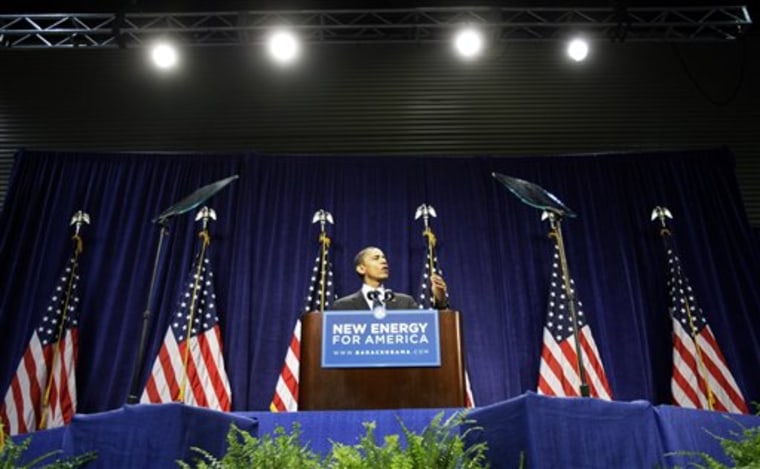In a reversal, Barack Obama proposed Monday that the government sell 70 million barrels of oil from its strategic petroleum stockpile to help reduce gasoline prices.
The Democratic presidential candidate said in a major energy speech that in the short-run the move could help drive down gasoline prices that now top $4 a gallon. Previously, Obama opposed tapping into the reserve, located in caverns in Texas and Louisiana.
Past releases from the reserve have "lowered gas prices within two weeks," Obama said.
The Illinois Democrat said U.S. politicians have failed for three decades to deal with the energy crisis and his GOP rival John McCain has "been part of that failure."
Obama called tapping the petroleum reserve a short-term response to a long-term problem.
"Breaking our oil addiction is one of the greatest challenges our generation will ever face. It will take nothing less than a complete transformation of our economy," he said. "This transformation will be costly, and given the fiscal disaster we will inherit from the last administration, it will likely require us to defer some other priorities."
Speaking to reporters in Pennsylvania, McCain again advocated more oil drilling off the U.S. coast. "Anybody who says that we can achieve energy independence without using and increasing these existing energy resources either doesn’t have the experience to understand the challenge that we face or isn’t giving the American people some straight talk."
Ready to compromise on drilling
Obama also reiterated his statement Friday that he could support limited new offshore drilling if it were needed to enact a compromise energy policy to foster fuel-efficient autos and alternative energy sources. He spoke warmly of a compromise proposed Friday by 10 moderate to conservative senators from both parties.
"Like all compromises, this one has its drawbacks. It includes a limited amount of new offshore drilling, and while I still don't believe that's a particularly meaningful short-term or long-term solution, I am willing to consider it if it's necessary to actually pass a comprehensive plan," Obama said. "I am not interested in making the perfect the enemy of the good particularly since there is so much good in this compromise that would actually reduce our dependence on foreign oil."
In remarks that elicited sympathetic boos from his supportive audience, the Illinois senator said of McCain, "Like George Bush and Dick Cheney before him, he sees more drilling as the answer to all of our energy problems, and like them, he's found a receptive audience in the very same oil companies that have blocked our progress for so long. In fact, he raised more than $1 million from big oil just last month."
Also on Monday, the Obama campaign unveiled a television ad that criticizes McCain's energy policies.
"After one president in the pocket of big oil we can't afford another," says the ad, referring to President Bush's previous work in the oil industry.
Responding to the new ad, McCain spokesman Tucker Bounds said "it was Sen. Obama, not John McCain, who voted for the Bush-Cheney energy bill that was a sweetheart deal for oil companies. Also not mentioned is the $400,000 from big oil contributors that Barack Obama has already pocketed in this election."
McCain’s campaign accused the Democrat of flip-flopping on offshore drilling, but the Arizona Republican himself had opposed such drilling until June.
The new Obama ad trumpets his proposal to revive a windfall profits tax on energy companies and asserts that McCain favors tax breaks for the oil industry.
"A windfall profits tax on big oil to give families a thousand-dollar rebate," an announcer in the ad says.
Obama has pushed for such a tax to fund $1,000 emergency rebate checks for consumers besieged by high energy costs.
More energy stops this week
Obama is emphasizing energy and the economy in campaign stops this week in Michigan, Ohio and Indiana. Gas prices over $4 a gallon have become a top issue in the presidential contest and polls show McCain has used the issue to gain ground on Obama.
In the past, Obama has not advocated tapping the oil reserve, but campaign spokeswoman Heather Zichal said he has reconsidered. "He recognizes that Americans are suffering," she said.
The nation's strategic petroleum reserve contains 707.2 million barrels in salt caverns in Texas and Louisiana. It was last tapped shortly after Hurricane Katrina. Otherwise, Bush has refused to use the reserves, saying they need to be left intact as an emergency stockpile. However, in the face of strong congressional pressure, Bush in June stopped filling the reserve until oil prices decline.
Obama's call for using the government reserve mirrors a proposal that has been pushed by congressional Democrats, but opposed by Republican leaders and the White House.
Democratic House Speaker Nancy Pelosi for weeks has called for Bush to withdraw a "small amount" of oil from the government reserve to add to supplies and try to force down prices.
Sen. Jeff Bingaman, the Democratic chairman of the Senate Energy and Natural Resources Committee, has tried to get agreement on legislation that would require the release of 70 million barrels of oil from the government stockpile over six months with the oil to be returned at a later date.
Both presidential candidates have energy proposals to reduce U.S. dependence on oil. Obama's was first, and its centerpiece is a 10-year, $150 billion spending plan focusing on clean coal technology, further development of plug-in hybrid cars, commercialization of wind and solar power and other measures.
McCain's, which is called the Lexington Project, includes building 45 new nuclear power plants; offering a $300 million prize for major advancement of low-cost, plug-in hybrid or electric car technology; and "encouraging the market" in wind, hydroelectric and solar power. Both he and Obama would cut use of fossil fuels to combat climate change.
